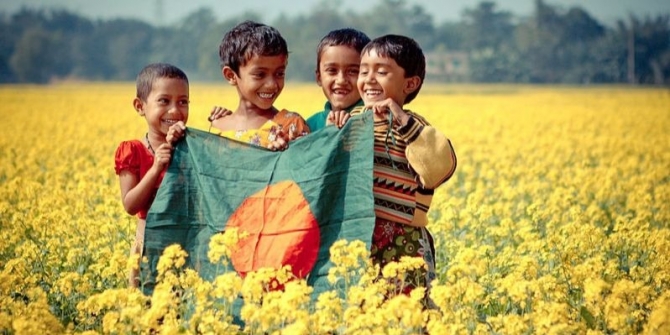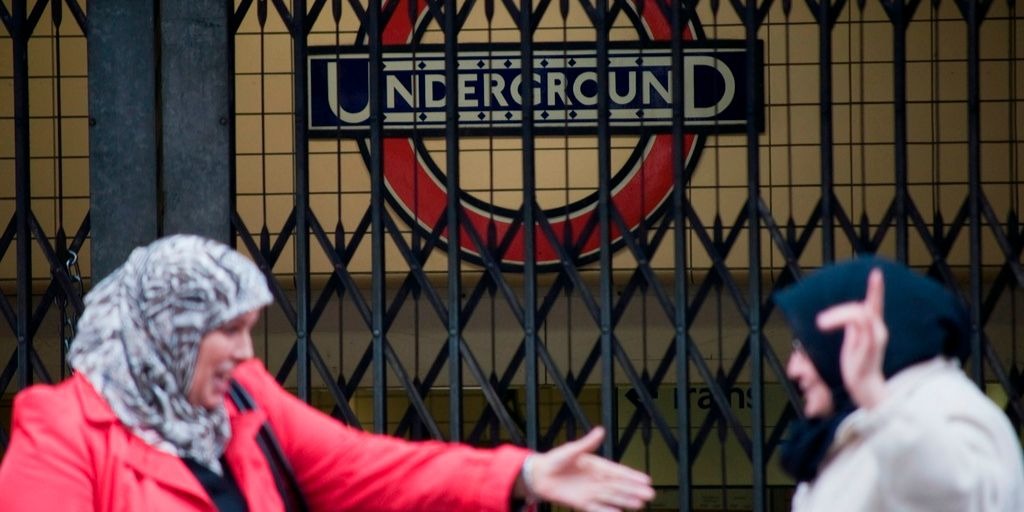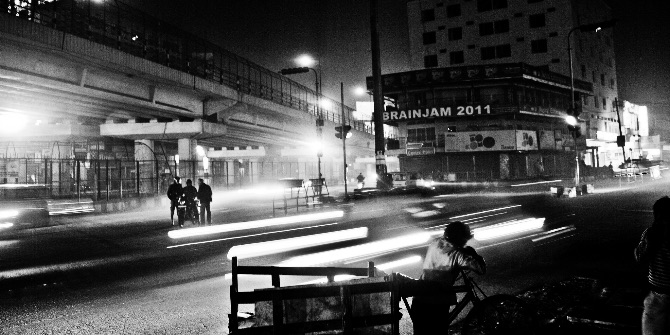The South Asia Centre (LSE) and the Subir and Malini Chowdhury Center for Bangladesh Studies (UC Berkeley) will be co-hosting the first-ever LSE-UC Berkeley Bangladesh Summit at Sheikh Zayed Theatre, LSE on June 5, 2018. The Summit celebrates the resilience of a nation confronted with an array of challenges.
In recent months, Bangladesh has frequently made headlines for its substantial generosity in accepting nearly a million Rohingya refugees fleeing Myanmar (Burma). Despite a severe strain on its resources, Bangladesh has shown remarkable leadership in providing a safe haven for some of the poorest and most exploited people of the world. This is especially noteworthy at a time when many other economically stronger countries have shown hesitation or reluctance in welcoming refugees, and when Bangladesh itself has been wrought by internal challenges affecting its own citizens including significant security, development, economic and human rights issues. Bangladesh also faces other pressing challenges including the impact of global warming and climate change, which affect its fragile biodiversity and ecosystem more severely than those of its neighbours, India and China.
Bangladesh is a country that for many years, whether among academics, from the media, and within policy circles, has received either very little attention or largely negative attention. The goal of this Summit is to focus on Bangladesh not only as a country characterised by a host of problems that require solutions, but rather as one that is marked by resilience, ripe with opportunities and possibilities. Like other countries, Bangladesh’s challenges are internal, external, man-made and/or natural.
This Summit will focus on some of the issues that confront Bangladesh as it moves forward, examining how it has approached them from the uniqueness of its singularity, and what other solutions may be available and possible. Panelists will discuss the rights of minorities, ethnic groups and the wider society within which they are located, and hear the views of individuals from different contexts – academics, researchers, activists, grassroots workers, and media personnel, amongst others. In focusing on these topics in our first Summit, we seek to alter the standard terms of debate surrounding academic discussions on Bangladesh that have usually focused on issues of development, climate change, poverty, and corruption. Our purpose is to understand other equally significant issues confronting the nation from multiple perspectives, and identify ways forward to address them in contemporary times.
The Summit will begin at 10 am with a welcome address by Dr Nilanjan Sarkar, Deputy Director of the South Asia Centre, followed by opening remarks by Dr Kasia Paprocki from the Department of Geography and Environment, LSE. The three panel discussions will be on Minority Rights (10.30 am – 12.00 pm), The Idea of Bangladesh (12.00 pm – 1.30 pm), and Civil Society and State (2.30 pm – 4.00 pm). LSE’s Prof. Naila Kabeer will deliver a plenary lecture at 4.00 pm on “Parallel Narratives of Nationhood: Gender, Islam and Civil Society in Bangladesh”
Minority Rights
As a ‘People’s Republic’, the axis of Bangladesh’s parliamentary democracy is its written Constitution (1972), which guarantees equal rights to all of its citizens; yet, other forces (conservatism, orthodoxy or populism) may intervene both indirectly, and aggressively, along a continuum that ranges from the legal and normative, to discrimination, vigilantism and criminality, in defiance of equality.
In recent years, minorities in Bangladesh have been confronted with serious intimation, or death, that has challenged the ‘equality, human dignity and social justice’ that the founding principles of its Constitution promised to its peoples. This panel will consider the question of minority rights in Bangladesh, examining how the complex question of personal identity needs to be addressed within the parameters of constitutional principles, legal frameworks, and equality.
The panel discussion will be held from 10.30 am to 12 pm and will be chaired by Prof Katy Gardner of the Department of Anthropology, LSE. The panelists include Prof Shelley Feldman, Professor Emeritus of Sociology at Cornell University, and Dr Delwar Hussain, Lecturer and Chancellors Fellow at the School of Social and Political Science, University of Edinburgh.

The Idea of Bangladesh
The second panel, “The Idea of Bangladesh” will be held from 12.00 pm to 1.30 pm, and will be moderated by Dr Sanchita Saxena, Director of the Subir and Malini Chowdhury Center for Bangladesh Studies, and Executive Director of the Institute for South Asia Studies (ISAS) at the University of California-Berkeley.
The panellists include Dr Meghna Guhathakurta from Research Initiatives Bangladesh (RIB), Dr Kieran Mitton from King’s College, and Dr Shahpar Selim from International Centre for Climate Change and Development, Dhaka.
The dominant academic idiom about Bangladesh is often unflattering, couched in issues of poverty, development, corruption, political instability, etc. Research is frequently set in a negative framework, even where it makes positive suggestions for improvement. While several of these issues are in fact part of the everyday realities of Bangladesh, a chronic attention to them has led to a dominantly negative image; as such, Bangladesh’s positive contributions in the world are overshadowed and sidelined in academic debates.
This panel seeks to reposition the terms of debates on Bangladesh by focusing singularly on its positive global footprint – the contribution of readymade garments (RMG) to the economies of several nations; the role of Bangladesh’s military as UN Peacekeeping Forces in Sierra Leone, leading to the adoption of Bengali as Sierra Leone’s second national language in 2012; and most recently, its iconic and immeasurably hospitable response to the Rohingya refugees despite the tremendous strain on all her resources.
Civil Society and State
The final panel will begin at 2.30 pm and will be moderated by LSE South Asia Centre Director Dr Mukulika Banerjee. The panellists include Prof. Joseph Devine from University of Bath, Ms Sara Hossain, a barrister practicing in the Supreme Court of Bangladesh, and Prof. David Lewis, Professor of Social Policy and Development, LSE.
Bangladesh is often portrayed as a country that is home to a visible and vibrant civil society, encompassing organisations and associations that exist outside of the state and the market. While a vibrant society can affect change and foster civic participation, it can also imply that the state is inherently weak. As such, the ‘state’ in Bangladesh can, paradoxically, be characterised as both ‘strong’ and ‘weak’. While it is strong in terms of its all-encompassing and formal presence in the daily lives of citizens, it is weak when it comes to citizen accountability and its limited capacity to provide services and represent the interests of marginalised populations.
This panel will examine the complex interrelationship between civil society and the state in Bangladesh. How do we think about this relationship: is it one of opposition (civil society in opposition to the state, putting pressure on the government to make policy changes) or cooperation (civil society cooperates with the state and is almost the preferred mechanism for service provision)? Are informal social movements focused on long-term societal change discouraged and instead, a singular emphasis on tangible, immediate outcomes like service delivery encouraged? Where is the state’s vision of defending minority identities? Has a robust civil society helped or hurt the country’s prospects for a more democratic engagement with its citizens through protection of rights and articulation of citizens’ duties?
Each panel discussion will produce a Working Paper which will be available free to download from our websites. Interviews and reports from the Summit will be released over the next few months on South Asia @ LSE.
Click here for the complete schedule and here to register.
This article gives the views of the author, and not the position of the South Asia @ LSE blog, nor of the London School of Economics. Please read our comments policy before posting.








I’m really loving the theme/design of your blog. Do you ever run into any
web browser compatibility problems? A small number of my blog readers
have complained about my blog not operating correctly in Explorer but looks great in Safari.
Do you have any ideas to help fix this issue? http://ultrananomax.org/
I’m really loving the theme/design of your blog. Do you ever run into any web browser
compatibility problems? A small number of my blog readers have complained about my blog not operating correctly
in Explorer but looks great in Safari. Do you have any ideas to help fix this issue? http://ultrananomax.org/